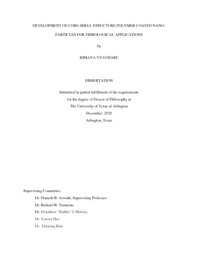
ATTENTION: The works hosted here are being migrated to a new repository that will consolidate resources, improve discoverability, and better show UTA's research impact on the global community. We will update authors as the migration progresses. Please see MavMatrix for more information.
Show simple item record
| dc.contributor.advisor | Aswath, Pranesh B | |
| dc.contributor.advisor | Timmons, Richard B | |
| dc.contributor.advisor | Hao, Yaowu | |
| dc.creator | Vyavhare, Kimaya | |
| dc.date.accessioned | 2023-06-27T17:07:00Z | |
| dc.date.available | 2023-06-27T17:07:00Z | |
| dc.date.created | 2020-12 | |
| dc.date.issued | 2020-12-07 | |
| dc.date.submitted | December 2020 | |
| dc.identifier.uri | http://hdl.handle.net/10106/31313 | |
| dc.description.abstract | Lubricating oils are of paramount importance for controlling frictional energy losses in automotive engines and maintaining the overall performance of the vehicle components. These oils contain various P and S based chemical species to help reduce friction and wear of metallic parts, and thus, enhance durability and energy efficiency of engines. Unfortunately, the beneficiary performance of the current engine oil additive technology i.e. zinc dialkyl dithiophosphate (ZDDP) comes with a major drawback of reducing the lifespan and efficiency of an automobile’s pollutant-reducing catalytic converter, thus increasing harmful emissions in the surrounding. This research work is a step towards making engines more efficient and sustainable through the development of functionalized nanoparticles as environment-friendly lubricant anti-wear additives. For this purpose, surface tailored nanoparticles were employed to deliver chemical species at tribological contacts for improving anti-friction and anti-wear characteristics. Plasma polymerization technology was used to coat or encapsulate nanoparticles with chemistries known to provide good tribological outcomes. In this study, different nanoparticles (ZnO, CaCO3) were plasma treated with different chemistries (fluorine, boron) and tribologically tested along with other anti-wear additives including ashless thiophosphates additives to overcome the current challenges of lowering phosphorus content in engine oil and improving the fuel efficiency. The objective of this thesis work is to study the tribological performance of plasma functionalized core-shell structure nanoparticles under boundary lubrication regime and develop a comprehensive understanding of their tribofilm properties and its implications on friction and wear outcomes. As the first approach, an experimental methodology was developed to synthesize core-shell structure ZnO nanoparticles coated with fluorocarbon polymer films and prepare oil formulations with a low concentration of ZDDP. These nano-lubricants were tribologically tested and properties of in-situ formed anti-wear tribofilms were studied using advanced surface characterization techniques like X-ray absorption near-edge spectroscopy (XANES), X-ray photoelectron spectroscopy (XPS), Scanning probe microscopy (SPM), and Scanning electron microscopy (SEM). Results indicate that core-shell structure ZnO nanoparticle can effectively deliver coated fluorine chemistry at a tribological interface to form advance tribofilms and significantly improve friction and wear properties. Additionally, the plasma polymerization approach was extended and applied to different coating chemistry like boron and nanoparticles like CaCO3. Overall results indicate that the developed polymer-coated ZnO and CaCO3 nanoparticles are very effective in reducing harmful levels of phosphorus in oils without compromising tribological properties. Additionally, they exhibit synergistic interactions with conventional additives to form robust tribofilms leading to enhanced friction and wear protection at sliding contacts. The surface tailored nanoparticles-based additives (ZnO, CaCO3) developed in this study can contribute to research advancement in lubrication technology and, as such, lead to the development of more energy-efficient and environmentally friendly outcomes when used in automotive engines. | |
| dc.format.mimetype | application/pdf | |
| dc.language.iso | en_US | |
| dc.subject | Wear Additives, Tribofilm, Plasma polymerization, Functionalized Nano-particles. | |
| dc.title | DEVELOPMENT OF CORE-SHELL STRUCTURE POLYMER COATED NANO-PARTICLES FOR TRIBOLOGICAL APPLICATIONS | |
| dc.type | Thesis | |
| dc.date.updated | 2023-06-27T17:07:00Z | |
| thesis.degree.department | Materials Science and Engineering | |
| thesis.degree.grantor | The University of Texas at Arlington | |
| thesis.degree.level | Doctoral | |
| thesis.degree.name | Doctor of Philosophy in Materials Science and Engineering | |
| dc.type.material | text | |
| dc.creator.orcid | 0000-0003-3900-8619 | |
Files in this item
- Name:
- VYAVHARE-DISSERTATION-2020.pdf
- Size:
- 9.794Mb
- Format:
- PDF
This item appears in the following Collection(s)
Show simple item record


